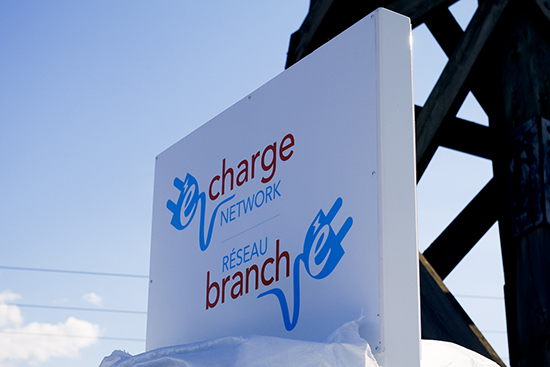News
<< Back to News Listing
MCW Supports a Major Step Forward for Battery-Powered Driving in New Brunswick
July 12, 2017
July 6th was an exciting day for New Brunswick electric vehicle owners and Maritimes clean energy enthusiasts at large: the province’s first direct current (DC) fast charging station was revealed by NB Power and its project partners to the public.

NB Power director of product development Brad Wasson, Irving Oil director of retail operations Tyler McLaughlin and Fredericton MP Matt DeCourcey unveil the first of 10 EV fast chargers in New Brunswick, with event participants from local media, project partners, and even Tom McLean, the first local EV owner to use the fast charger.
By the end of the summer, the e-Charge Network within New Brunswick will be bolstered with ten of these fast chargers. The fast chargers are all located at stations along Highway 2, an important leg of the Trans-Canada Highway network. Plans are also in place to add an additional 5 quick chargers to the network by the end of 2017. MCW is a proud project partner on this exciting clean energy infrastructure project. Our MCW Maricor team provided electrical design engineering for each station and its connection to the electrical grid while MCW Custom Energy Solutions provided project and construction management services.
Other provinces are also well on their way to expanding EV charging infrastructure – particularly Quebec, Ontario and British Columbia. In the near future, Canadians will be able to traverse the whole country in their all-electric vehicle without using a single drop of gasoline!
Explore the map below to see the exact locations of NB Powers’ first 10 fast charging stations. Click each location to see its exact address and the location’s commercial partner:
A fast charging station – commonly referred to as a Level 3 charger - uses 400 volt direct current to quickly power up all-electric cars (the chargers aren’t suitable for currently-available hybrids). Chargers of this calibre are significantly faster than most chargers you see in parking lots and on street curbs; it’s more akin to Tesla’s Superchargers. These units will charge up a 2017 Tesla Model S 75D (the base model with the smallest 75 kWh battery) to about 80% in roughly 45 minutes. Once finished, that Model S driver can expect to cruise for well over 300km before needing a recharge. To put that in to perspective, the largest gap between NB Power’s fast charging stations is only about 90km. That’s the kind of coverage that will help reduce range anxiety among New Brunswick’s EV drivers (and road-trippers travelling through the province) who can rest assured knowing that the next fast charger is coming up soon.

